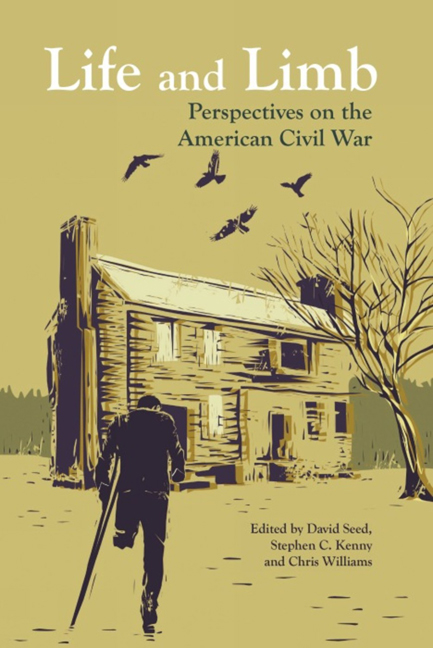Book contents
- Frontmatter
- Contents
- List of Illustrations
- Acknowledgements
- Introduction: Civil War Voices and Views
- MEDICAL AND SURGICAL MEMOIRS
- ACCOUNTS OF NURSING
- MEDICAL FACILITIES AND PATHOLOGY
- Jonathan Letterman on the Medical Corps: Medical Recollections of the Army of the Potomac
- The Confederate Military Prison Hospital at Andersonville, Georgia: Contributions Relating to the Causes and Prevention of Disease
- Field Hospitals: A Glimpse: Hardtack and Coffee
- Field Hospitals: The Need: A Manual of Military Surgery
- Plea for an Ambulance Service: A Brief Plea for an Ambulance System
- Hospital Broadside: North Carolina Hospital Broadside, 1863
- Hospitals in Richmond, Virginia: A Diary from Dixie
- Malingering: ‘Surgical Reminiscences of the Civil War’ and A Rebel's Recollections
- Roberts Bartholomew on Nostalgia: Contributions Relating to the Causes and Prevention of Disease
- Medical Welfare Begins: ‘Debut and Prospectus (The Crutch) and ‘Wounded’ (poem by ‘Sanatosia’)
- (Dis)embodied Identities: Civil War Soldiers, Surgeons, and the Medical Memories of Combat
- PHOTOGRAPHY
- AMPUTATIONS AND PROSTHETIC LIMBS
- IN THE FIELD OF BATTLE
- POST-WAR NARRATIVES
- Contributors
- Select Bibliography
- Index
- Plates
Malingering: ‘Surgical Reminiscences of the Civil War’ and A Rebel's Recollections
from MEDICAL FACILITIES AND PATHOLOGY
- Frontmatter
- Contents
- List of Illustrations
- Acknowledgements
- Introduction: Civil War Voices and Views
- MEDICAL AND SURGICAL MEMOIRS
- ACCOUNTS OF NURSING
- MEDICAL FACILITIES AND PATHOLOGY
- Jonathan Letterman on the Medical Corps: Medical Recollections of the Army of the Potomac
- The Confederate Military Prison Hospital at Andersonville, Georgia: Contributions Relating to the Causes and Prevention of Disease
- Field Hospitals: A Glimpse: Hardtack and Coffee
- Field Hospitals: The Need: A Manual of Military Surgery
- Plea for an Ambulance Service: A Brief Plea for an Ambulance System
- Hospital Broadside: North Carolina Hospital Broadside, 1863
- Hospitals in Richmond, Virginia: A Diary from Dixie
- Malingering: ‘Surgical Reminiscences of the Civil War’ and A Rebel's Recollections
- Roberts Bartholomew on Nostalgia: Contributions Relating to the Causes and Prevention of Disease
- Medical Welfare Begins: ‘Debut and Prospectus (The Crutch) and ‘Wounded’ (poem by ‘Sanatosia’)
- (Dis)embodied Identities: Civil War Soldiers, Surgeons, and the Medical Memories of Combat
- PHOTOGRAPHY
- AMPUTATIONS AND PROSTHETIC LIMBS
- IN THE FIELD OF BATTLE
- POST-WAR NARRATIVES
- Contributors
- Select Bibliography
- Index
- Plates
Summary
The following is from William Williams Keen, ‘Surgical Reminiscences of the Civil War.’ The essay referred to is William W. Keen, S. Weir Mitchell, and George W. Morehouse, ‘On Malingering, especially in Regard to Simulation of Diseases of the Nervous System,’ American Journal of the Medical Sciences 48 (October 1864), pp. 367–94. The same three authors also published Gunshot Wounds and Other Injuries of Nerves (Philadelphia: J.B. Lippincott, 1864).
Very naturally among so many soldiers of diverse character, and especially of men with wounds and injuries of the nervous system, we had perhaps more than our usual proportion of malingerers. In the American Journal of the Medical Sciences for October, 1864, p. 367, in a paper on ‘Malingering,’ especially in regard to simulation of diseases of the nervous system, a number of our conclusions were stated. From the necessity of the case, we devised some new means for discovering such malingerers. We first suggested the use of ether (alone or in combination with other means) as a test in a number of alleged diseases and conditions in which it had never before been used. It proved a most efficient method of detection. For instance, in asserted blindness, we suggested that the man should be etherized, the sound eye then covered with adhesive plaster, and when recovering from the anaesthetic, before he was able to reason and guard himself against making mistakes, that his sight should be tested by very simple means, such as holding out to him in the hand some water or some whiskey, or any other act which would reveal the presence or absence of sight in the supposed blind eye. So in deafness we discovered some malingerers by the old trick of gradually lowering the voice; but hearing, like sight, can best be tested during the recovery stage of ether when the patient is taken unawares, as Parr, in his ‘Medical Dictionary,’ speaks of a man who pretended to be dumb, of whom a sympathetic passer-by, with most insidious humanity, inquired: ‘How long have you been dumb, my good friend?’ ‘Three weeks, sir,’ replied the uncautious deceiver.
The next text is from George Cary Eggleston (1839–1911), A Rebel's Recollections (Cambridge, MA: The Riverside Press, 1875), Chapter 7 (‘Some Queer People’). The sketches first appeared in the Atlantic Monthly.
- Type
- Chapter
- Information
- Life and LimbPerspectives on the American Civil War, pp. 71 - 73Publisher: Liverpool University PressPrint publication year: 2015



